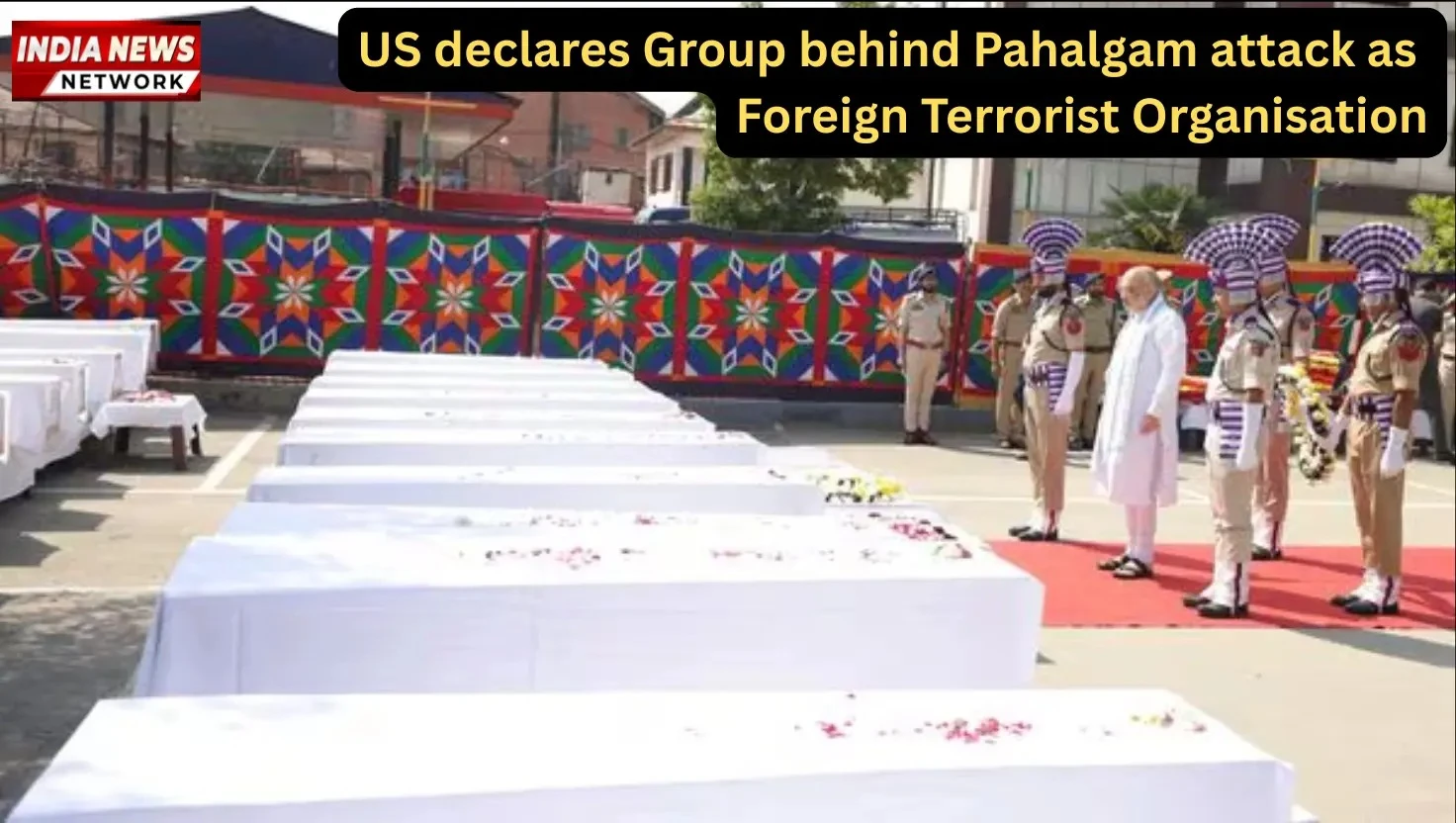US declares Group behind Pahalgam attack as Foreign Terrorist Organisation

US declares Group behind Pahalgam attack as Foreign Terrorist Organisation
China urges enhanced counter-terrorism cooperation after the US designates The Resistance Front as a foreign terrorist organisation linked to the Pahalgam attack.
China has responded to the recent designation of The Resistance Front (TRF) as a foreign terrorist organisation by the United States, which is linked to the deadly attack in Pahalgam, Jammu and Kashmir.
During a media briefing on Friday, Lin Jian, spokesperson for the Chinese Foreign Ministry, expressed opposition to all forms of terrorism and condemned the attack that occurred on April 22, resulting in the deaths of 26 individuals. The TRF, a group believed to be a proxy of the Pakistan-based terrorist organisation Lashkar-e-Tayyiba (LeT), claimed responsibility for the attack but subsequently retracted its statement amid heightened tensions between India and Pakistan.
Lin called on regional nations to bolster counter-terrorism efforts and work collaboratively to ensure regional security and stability. He stated, “China firmly opposes all forms of terrorism and strongly condemns the terrorist attack that occurred on April 22.”
The US Secretary of State Marco Rubio announced the designation of TRF as both a Foreign Terrorist Organisation and a Specially Designated Global Terrorist. This move is expected to resonate within the United Nations Security Council, particularly concerning the 1267 Committee, which is tasked with designating terrorists and their affiliated organisations.
The 1267 sanctions regime has previously targeted various Pakistani terrorist groups, imposing asset freezes, travel bans, and arms embargoes on prominent entities such as LeT, Jaish-e-Mohammad (JeM), and Jamaat-ud-Dawa (JuD), along with notorious leaders like Hafiz Saeed and Masood Azhar.
Following the Pahalgam attack, the UN Security Council issued a statement on April 25 condemning the violence, though references to TRF and its connections to LeT were reportedly removed after objections from both Pakistan and China.
A report from the Pakistani daily Dawn highlighted that the US designation seemed to align with India's perspective, which has long contended that the TRF functions as a 'front' for the prohibited LeT.
In a show of force following the attack, India initiated Operation Sindoor on May 7, aimed at dismantling terrorist infrastructure situated in Pakistan and Pakistan-occupied Kashmir as a form of retaliation. After four days of intense conflict, marked by cross-border drone and missile strikes, India and Pakistan reached a tentative agreement on May 10 to de-escalate the situation.
The ongoing complexities of regional security and the interplay between various state and non-state actors continue to shape the discourse around terrorism in South Asia.
As the international community monitors these developments, the focus remains on the necessity of cohesive counter-terrorism strategies that address the root causes of violence while prioritising regional stability.
During a media briefing on Friday, Lin Jian, spokesperson for the Chinese Foreign Ministry, expressed opposition to all forms of terrorism and condemned the attack that occurred on April 22, resulting in the deaths of 26 individuals. The TRF, a group believed to be a proxy of the Pakistan-based terrorist organisation Lashkar-e-Tayyiba (LeT), claimed responsibility for the attack but subsequently retracted its statement amid heightened tensions between India and Pakistan.
Lin called on regional nations to bolster counter-terrorism efforts and work collaboratively to ensure regional security and stability. He stated, “China firmly opposes all forms of terrorism and strongly condemns the terrorist attack that occurred on April 22.”
The US Secretary of State Marco Rubio announced the designation of TRF as both a Foreign Terrorist Organisation and a Specially Designated Global Terrorist. This move is expected to resonate within the United Nations Security Council, particularly concerning the 1267 Committee, which is tasked with designating terrorists and their affiliated organisations.
The 1267 sanctions regime has previously targeted various Pakistani terrorist groups, imposing asset freezes, travel bans, and arms embargoes on prominent entities such as LeT, Jaish-e-Mohammad (JeM), and Jamaat-ud-Dawa (JuD), along with notorious leaders like Hafiz Saeed and Masood Azhar.
Following the Pahalgam attack, the UN Security Council issued a statement on April 25 condemning the violence, though references to TRF and its connections to LeT were reportedly removed after objections from both Pakistan and China.
A report from the Pakistani daily Dawn highlighted that the US designation seemed to align with India's perspective, which has long contended that the TRF functions as a 'front' for the prohibited LeT.
In a show of force following the attack, India initiated Operation Sindoor on May 7, aimed at dismantling terrorist infrastructure situated in Pakistan and Pakistan-occupied Kashmir as a form of retaliation. After four days of intense conflict, marked by cross-border drone and missile strikes, India and Pakistan reached a tentative agreement on May 10 to de-escalate the situation.
The ongoing complexities of regional security and the interplay between various state and non-state actors continue to shape the discourse around terrorism in South Asia.
As the international community monitors these developments, the focus remains on the necessity of cohesive counter-terrorism strategies that address the root causes of violence while prioritising regional stability.

Reliance Retail acquires Kelvinator, The Coolest One
Reliance Retail has purchased the Kelvinator brand from Electrolux for nearly ₹160 crore, aiming to strengthen its position in India's consumer durables market.
| 2025-07-19

Saiyyara has shattered every myth about launching newcomers. No big names, no big PR
Madhur Bhandarkar praises debut film 'Saiyaara' for its raw talent and storytelling, marking a shift in Bollywood's approach to newcomers.
| 2025-07-19

India slams reports blaming pilots for Air India crash
India's AAIB disputes US media assertions regarding Air India AI 171 crash, highlighting ongoing investigation and sensitivity towards victims' families.
| 2025-07-18

India Secures Four-Wicket Win in ODI Series Opener Against England
India achieves a four-wicket victory over England in the ODI series opener, led by Deepti Sharma's unbeaten 62 runs.
| 2025-07-17

Air India inspection claims no problems found with Boeing 787 fuel control switches
Air India has conducted thorough inspections of its Boeing 787 fuel control switches, reporting no problems following a DGCA directive.
| 2025-07-17




